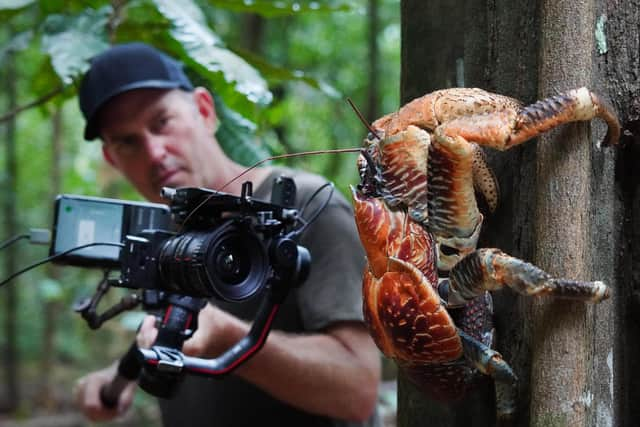Final episode of A Year on Planet Earth
and live on Freeview channel 276
The curtain goes up on the final episode of this breath-taking series, presented by Stephen Fry, ending with autumn, a season of change for many creatures. For some it provides opportunities, but it brings huge challenges for others.
In September in Northern Canada, temperatures reach -20C, yet there is one stretch of river that still flows and ‘ice bears’ can fish for the final salmon of the season. Those that can’t survive the cold weather, however, need to get on the move. Monarch butterflies emerge, and set off on a mammoth 2,500-mile migration to Mexico.
Advertisement
Hide AdAdvertisement
Hide AdSouth of the Equator, autumn is the toughest time of the year in Southern Africa. The rains have been gone for many months and watering holes have all but dried up, leaving an elephant calf dangerously vulnerable to predators.


Meanwhile, at almost a year old, it’s time for a king penguin chick on Marion Island to answer the call of the ocean. She’s replaced her fluffy coat with tightly packed waterproof feathers but unfortunately for her, troubled waters lie ahead.
For Fry, presenting this series provided a timely lesson. “It’s a reinforcement of what we all know deep down: the interconnectedness of all the world’s life systems,” he says.
“The running of warm air into cool air, of cool water currents into warm water currents… from these movements, created entirely by the tilt of the Earth and its journey around the sun, following the basic laws of physics, how everything we think and know about life and living, and everything we are is as a result of that.”
Advertisement
Hide AdAdvertisement
Hide AdHe goes on: “Watching the vast migrations of animals who instinctively know that there is a band of rain coming down from the Equator, and that if only they band together to journey a thousand miles to the north, they and their new young might reach its benevolent drops.”
Like millions of us, Fry grew up watching ITV’s Survival documentary, alongside Sir David Attenborough’s prodigious BBC output, sparking a love of the natural world, and fronting this series allowed him to visit a place he’d previously never visited.
“I had never been to Iceland before, so there was something extra special about hiking up to Europe’s biggest glacier and standing there, trying to make sense of the fact that we are – even in such tranquil silent spots – always hurling round the sun at 250,000 mph.
“It’s wonderful to watch an individual flake settling onto the glacier to become part of a vast million-tonne blanket of snow, but then under the rays of a lifting sun, reverting to a drop of water that trickles down, following nothing but gravity, to join a rivulet, then a beck, then a rill, then a stream, then a river until finally it becomes part of a gigantic torrent.
Advertisement
Hide AdAdvertisement
Hide Ad“It’s hard not to get poetic, thinking of such simultaneously tiny and titanic moments in nature and our cosmos.”
As amazing as the insights offered by this series have been, it also nudges everyone to consider the threat of climate change. “The warm only has to be a bit warmer and its collision with the cool will create outcomes more extreme than we can bear to think about,” Fry says.